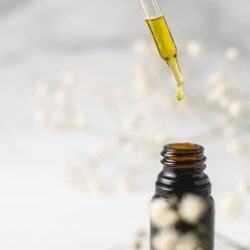This information is provided for educational purposes only. Reader retains full responsibility for the use of the information contained herein.
In recent years, cannabidiol, better known as CBD, has been touted as a remedy for all sorts of ailments, from seizures to pet anxiety. It is found in products as diverse as capsules and oils to hair pomade and potato chips. However, many people are still unfamiliar with what CBD is, its legal status under both state and federal law, and its effect on drug testing.
CBD, THC, marijuana, and hemp
CBD is a compound found in the cannabis plant. It can be found in both hemp and marijuana. CBD has become extremely popular recently as a medical treatment for a variety of ailments. CBD has been proven effective in treating seizures, but its use has expanded far beyond that. CBD is purported to alleviate anxiety, pain, insomnia, nausea, and much more. But high-quality research on human subjects has not yet backed up these claims. Neither is there high-quality scientific research on the correct dosage of CBD (except for treating childhood seizures) or on the potential side effects or drug interactions. There are still more questions than there are answers when looking at CBD as a medical treatment.
CBD is different than tetrahydrocannabinol, also known as THC. While both are compounds found in cannabis, THC is the chemical that causes the euphoric high associated with marijuana use. CBD itself does not produce a high and has no recreational use. But as CBD and THC are both found in the cannabis plant, CBD products often contain both substances. CBD and THC can be found in both marijuana and in hemp. In the United States, hemp by definition contains less than 0.3% THC and marijuana contains more than 0.3% THC.
The legality of CBD
Because CBD comes from cannabis, it oftentimes inhabits a grey area of legality with regards to federal law. Marijuana products are all considered illegal by the federal government, apart from the prescription drug Epidiolex and marijuana used for research in accordance with law. Because marijuana is an illegal substance it is not overseen by the Food and Drug Administration or other federal bodies outside of criminal enforcement. Hemp, on the other hand, is legal so long as it is produced in a manner consistent with the 2018 Farm Bill. Because CBD is a compound found in both marijuana and hemp, some CBD is legal, and some is not. However, even CBD that is technically legal violates federal law when it is added to food products or marketed as a dietary supplement.
In spite of federal law, many states have legalized both hemp- and marijuana-derived CBD under state law, and the federal government has largely turned a blind eye. This has led to a crazy quilt of CBD laws across the country. Some states, such as Idaho, ban CBD outright. Other states take the exact opposite approach; California, for instance, is advancing a bill that would legalize the sale of foods, beverages, and dietary supplements containing CBD[1].
Generally, states either permit CBD under legal marijuana programs, prohibit CBD, or have specific laws allowing CBD with restrictions. There are currently 36 states with some form of legalized marijuana laws that permit CBD products under their marijuana law. Other states prohibit marijuana but permit CBD products. Texas is one such state;[2] in Texas medical and recreational marijuana are prohibited but CBD is legal for qualified medical patients so long as it contains less than .5% THC and more than 10% CBD.[3] Similarly, in Tennessee CBD is legal for medical purposes if it contains less than 0.9% THC.[4] As mentioned before, Idaho prohibits CBD products except those derived from hemp and containing no THC whatsoever.[5]
CBD and drug testing
CBD is not screened for on a standard drug test; however, CBD use can sometimes trigger a positive drug test due to other substances present in the product. CBD products are almost never pure CBD. They very often contain THC, which is the compound tested for in marijuana drug screens. Even without using marijuana, the THC in CBD can potentially trigger a positive marijuana test.
There has been anecdotal evidence that CBD products are not always what they claim to be. Multiple people have sued CBD companies after they consumed CBD products labeled as zero THC, and subsequently tested positive for THC.[6] As well, terrible stories have emerged of people vaping CBD and suffering health emergencies, often when the CBD product is laced with substances such as synthetic marijuana.[7] There is no easy way for consumers to determine what substances are contained in any given CBD product.
While marijuana use has increasingly received legal protections in recent years, CBD use currently is not explicitly protected by law. Many states have passed laws that prohibit employers from taking adverse employment action against marijuana-using employees unless they pose a safety risk or are under the influence while at work. However, CBD use has not yet received any similar protections. Employers are generally free to prohibit CBD use by employees.
Conclusion
A key component to an effective workplace drug testing program is a clear and understandable policy. When employees and/or employers do not understand CBD, problems can arise, whether it be a surprise positive drug screen, legal trouble from possession of a prohibited product, or unintentional impairment. CBD is gaining popularity but is still not widely understood, and this can pose problems for individuals and organizations alike.
[1] https://legiscan.com/CA/bill/AB45/2021
[2] While Texas calls its law a medical marijuana law, for purposes of this article I consider it a CBD law because it limits permissible marijuana products to very low THC levels and also requires high levels of CBD.
[3] Texas Medical CBD Law, NORML, https://norml.org/laws/texas-cbd-marijuana-law/.
[4] Tennessee Medical CBD Law, NORML, https://norml.org/laws/tennessee-cbd-marijuana-law/
[5] Cannabidiol (CBD), Idaho Office of Drug Policy, https://odp.idaho.gov/cannibidiol/.
[6] Gill, Lisa L., Can you take CBD and pass a drug test?, Consumer Reports (May 15, 2019), https://www.consumerreports.org/cbd/can-you-take-cbd-and-pass-a-drug-test/
[7] Mohr, Holbrook, Some CBD vapes contain street drugs instead of the real thing, AP News (September 16, 2019), https://www.apnews.com/7b452f4af90b4620ab0ff0eb2cca62cc



